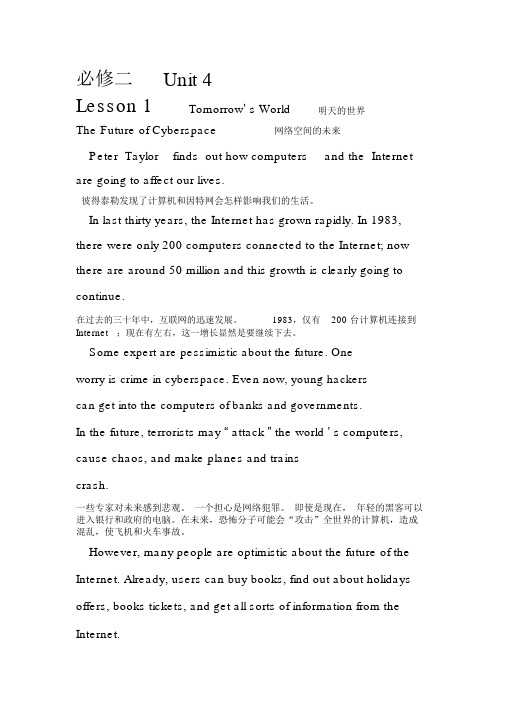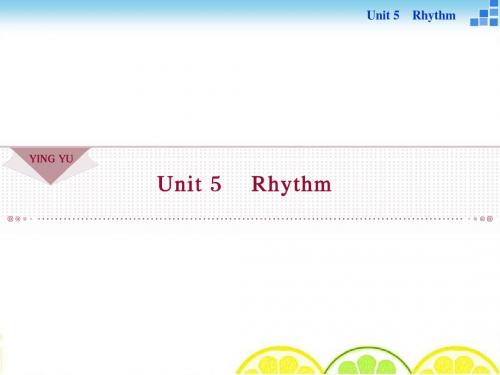2019精选教育北师大版高中英语必修二 unit5 lesson1 Performance reading学案无答案
- 格式:doc
- 大小:24.38 KB
- 文档页数:7


必修二Unit 4Lesson 1Tomorrow’ s World明天的世界The Future of Cyberspace网络空间的未来Peter Taylor finds out how computers and the Internet are going to affect our lives.彼得泰勒发现了计算机和因特网会怎样影响我们的生活。
In last thirty years, the Internet has grown rapidly. In 1983, there were only 200 computers connected to the Internet; now there are around 50 million and this growth is clearly going to continue.在过去的三十年中,互联网的迅速发展。
1983,仅有200 台计算机连接到Internet;现在有左右,这一增长显然是要继续下去。
Some expert are pessimistic about the future. Oneworry is crime in cyberspace. Even now, young hackerscan get into the computers of banks and governments.In the future, terrorists may “ attack ” the world ’ s computers, cause chaos, and make planes and trainscrash.一些专家对未来感到悲观。
一个担心是网络犯罪。
即使是现在,年轻的黑客可以进入银行和政府的电脑。
在未来,恐怖分子可能会“攻击”全世界的计算机,造成混乱,使飞机和火车事故。
However, many people are optimistic about the future of the Internet. Already, users can buy books, find out about holidays offers, books tickets, and get all sorts of information from the Internet.然而,许多人对因特网的未来持乐观态度。



U5 RhythmLesson 1 PerformanceObjectives■ To practise the vocabulary relating to concerts and performance.■ To read and understand a concert review.■ To practise using will for decisions.■ To practise using time clauses with as soon as, when, befo re... and clauses of concession with although/though.Resources usedCassette, Grammar Summary 3. Mini-Grammar 3Possible problemsStudents may have problems remembering to use the Present Simple in time clauses for the future instead of will.BackgroundAlanis Morissette ?C the Canadian rock singer, has won Grammy Awards for Best Rock Song and Best Rock Performance.Routes through the material■ If you are short of time, set some of the exercises for homework and omit Exercises 5 and 12.■ If you have time, do the Options activities.■ If you have two periods for this lesson, a suitable natural break is after Exercise 5.Language Power: pages 66?C67.Mini-Grammar: 3.ReadingBefore you startExercise 1Key WordsThe Concert?C the music, the singing, the guitar, the drums, the lighting, the special effects, the stage design,the sound, the songs, the wordsAdjectives?C boring, brilliant, exciting, fantastic, poor, quite good, really loud, disappointing, extraordinary, clear, unclear■ Read through the Key Words with the class.■ Ask students to talk about concerts they have watched ?C encourage them to say as much as possible and to give theiropinions.Read to learnExercise 2■ Students read through the titles (a?Cd) and guess the or der.Then they read the concert review and see if their guesses were correct. Answers1 d2 c3 b4 aExercise 3■ Students can pare their answers in pairs before checking the answers as a class. Answers1 Yes, because it was the performance of a real star.2 They enjoyed it very much ?C they loved the concert.3 The concert hall was cold and the sound was sometimes poor.4 Jagged Little Pill5 anger, love and joyExercise 4■ Students work in pairs, reading the text and finding the words. Answers1 audience2 album3 extremely4 throughout5 fan■ Ask students to look at the text again and to describe the songs “Everything But …〞and “Heartache〞.Exercise 5In groups, students discuss the possible reasons why pop music and rock ’n’ roll are loved by many young people.Students also discuss which performers they would like to hear at a live concert and give reasons.Each group reports their discussion to the class. Have a class discussion if necessary.Language Power: the Word Corner on page 67 gives further practice of concert vocabulary.Grammar will FOR DECISIONS; ADERBIAL CLAUSES(I): TIME AND CONSESSIONExercise 6■ Students listen to the telephone conversation on the cassette to find out who decides to pick up the tickets. Play the cassette twice if necessary.AnswersSue TapescriptSue: Hello.Ricky: Hi, it's me. Are we still going to the concert on Saturday? Sue: Yeah, fine.Ricky: I'll pick up the tickets at lunchtime tomorrow. No … I can't.I've got choir practice. I know. I'll go and pick them up as soon as school finishes.Sue: You can't tomorrow. It's early closing. The ticket office closes early.Ricky: You're right. Maybe my mum can get them. She works nearthe ticket office. I'll ask her when she gets back tonight.Sue: I've got a better idea, Ricky. I'll go and get them now, before I go to the dentist …Ricky: Oh, all right … but I said …Sue: I have to rush, otherwise I won't have time. Byeee!Exercise 7■ Read through the sentences with the students.■ Students then listen to the conversation again and note whosays the sentences.Answers1 Ricky2 Ricky3 Ricky4 Sue■ Play the cassette again, and ask:Why can't Ricky pick the tickets up at lunchtime tomorrow?(He's got choir practice.)Why can't he pick them up after school tomorrow?(The ticket office will be closed.)Where does Ricky's mum work? (Near the ticket office.)Where is Sue going after she's got the tickets?(To the dentist.)Exercise 8■ Play the cassette again and ask stude nts to listen for whichverb form Sue and Ricky use when they make sudden decisions.AnswerswillExercise 9■ In pairs, students read the sentence and decide what time the underlined part refers to ?C the present or the future?Answersthe future■ Students then look back at the sentences in Exercise 7 andidentify the linking words.Answersas soon as when beforeExercise 10■ Students read the sentences in pairs and underline the linkingwordsAnswersalthough Exercise 11■ Students work in pairs, discussing what response to make in each situation.Suggested answers2 I’ll have something to eat in that cafe.3 I’ll buy some flowers for my friend.4 I’ll watch that concert tonight.5 I’ll answer it.6 I’ll see who it is.Exercise 12■ Students work in pairs and try to think of two different endings for each sentence. ■ When checking answers, have several students give their answers for each sentence. The important point is that the verbs should be in the Present Simple tense.Suggested answers2 the lesson finishes3 you leave4 you pass your examination5 they are very busyLanguage in UseExercise 13■ Students ask and answer the questions, working in pairs.Go round to check that students are using the time and concession clauses correctly.OptionsPracticeStudents work in groups making chains starting with one of these sentences: When I can speak English fluently, I’ll …When I’m rich, I’ll …When I pass my driving test, I’ll …When I’m old enough, I’ll …The groups can then read out their chains to the rest of the class.ExtensionIf you or one of the students has a recording of AlanisMorissette, bring it into class and play one of the songs.Students can then discuss their reactions to the song, describi ng the singer’s voiceand the effect it has on them.。

Unit 5 Humans and NatureLesson 3 Race to the poleObjectives:To learn about the race to the South Pole and its historical significanceTo develop reading and comprehension skillsTo practice critical thinking and analysisMaterials:Textbook: Unit 5, Lesson 3 - "Race to the Pole"Handout: Discussion QuestionsProcedure:Warm-upAsk students if they know anything about the race to the South Pole or any other historical exploration expeditions.ReadingHave students read the story "Race to the Pole" in their textbooks individually.Ask students to underline any new vocabulary words or concepts that they are unfamiliar with. Ask students to summarize the story in their own words and share with a partner.Comprehension QuestionsAsk students to answer the comprehension questions at the end of the story individually or in pairs.Go over the answers as a class and discuss any differing opinions or perspectives.DiscussionHand out the Discussion Questions handout and have students discuss the questions in small groups.After students have had time to discuss, ask for volunteers to share their thoughts and opinions with the class.Extension Activity (Optional)Assign students to research one of the explorers mentioned in the story, such as Roald Amundsen or Robert Falcon Scott, and create a presentation on their life and accomplishments.Assessment:Participation in discussion and comprehension questionsQuality of critical thinking and analysis in discussionDiscussion Questions:What qualities do you think are necessary for someone to become an explorer?In your opinion, was the race to the South Pole worth the risks involved? Why or why not?Do you think that exploration is still important in modern times? Why or why not?Were the explorers in the story more motivated by personal glory or by a desire to advance scientific knowledge? Explain your answer.What do you think are some of the potential dangers or challenges of exploration that are unique to the 21st century?Homework:Imagine you are a member of one of the teams in the race to the South Pole. Write a diary entry describing your experiences during the journey, including the challenges you faced and how you overcame them.。
RhythmPerformancePart A Warm-up1. Look at the pictures and the Key Words. What kinds of music and dance do you know? Add to the listsStrings in a classical concert. Ballet on the stage.2. Which words can be use to discuss rhythm?Key Words: beautiful, famous, loud, noisy, fast, exciting, electric, popular, historical, excited, bright, traditional, sudden, important, differentPart B Reading: PerformanceBefore you startRead to learn2. Read the concert review and match the four paragraphs with the titlesb) how the audience reacteda) the end of concert页 1 第c) the songs played d) the start of the concert3. Read the review again and answer these questions.(1) Did the reviewer like the concert? Why or why not?(2) How did the audience react to the singer?(3) What things about the concert were not very good?(4) From which album were most of the songs?(5) What feelings did she show in her songs?Alanis—A True PerformerCanadian singer and song writer, Alanis Morissette, is used to being in the public eye. Her mostfamous album Jagged Little Pill, came out in 2019 when she was only twenty-one years old. It sold 15million copies and made her world famous. Since then she has made several more albums and she hascontinued giving great performance s on stage.Last Thursday night, hundreds of fans went to the Corn Exchange in Cambridge, England to seeAlanis Morissette performing in concert. It was Morissette's first performance in England since her song“Uninvited”won this year's Grammy Award for the best rock song. The 30-year-old singer has a strongfan base in England. There was not an empty seat anywhere in the concert hall at last Thursday's event,although it was an extremely cold night. “Sure it's cold outside, but I hope we'll warm it up in here foryou,”Morissette said to the large crowd before she started to play.During the 3-hour concert, Morissette used a lot of material from her award-winning album “JaggedLittle Pill”. She also played a few songs from her new album, such as “Everything But …”, which tellsthe story of someone looking for love in the wrong places. Morissette gave a creative and powerfulperformance in another song “Utopia”. Her singing was full of feeling; the first part of the song was filledwith anger, while the last part expressed love and joy.Although the concert hall was cold and the sound system caused a few problems, the audiencecould still enjoy the concert. Many people in the crowd were obviously long-time fans and they knew thewords and sang along to nearly every song. Throughout the concert, the atmosphere inside the concerthall was extremely exciting. Everyone agreed that they were greatly impressed by Morissette's brilliantmusic and singing.页 2 第At the end of the three hours, Morissette showed that she was a true performer, singing awell-known song “Heartache”. She finished the evening with a new song about the life of a superstar.While I watched and listened, I knew that I was seeing the performance of a real superstar.V oice your opinion4. Why are pop music and rock ‘n' roll loved by many young people?Part C Reading: Let's DanceBefore you start1. Listen to the music extracts and identify the dances in the box.Key Words: disco, classical ballet, Chinese folk dance, waltz, breakdance2. Read the text very quickly. Where is it from?a newspaper, a traditional encyclopedia, a magazine, a CD ROM encyclopedia.3. Read the text again and answer these questions.(1) Who started folk dance?(2) What is the main difference between folk and popular dances?(3) What's the ballroom dance that came from folk dance?(4) Why did a lot of new dances come from the United States?(5) What type of dancing became popular in the mid-1980s?Let's DanceBalletBallet began in Italy and France during the 15th century and is still an important art form in Westernculture. Ballet tells a story with music and actions but no words. One of the most famous ballets is called“Swan Lake”. Another famous Russian ballet is called “Sleeping Beauty”. Many countries have producedballets, including China. One well-known Chinese ballet is called “The White-haired Girl”.Folk DanceFolk dances are traditional styles of dancing that come from ordinary people. They are usuallygroup dances that are taught from one generation to another. China is famous formany different types offolk dances, including the dragon dance and the lion dance, which are performed during the SpringFestival. Other kinds of folk dances are the sword dance and the colourful peacock dance.页 3 第Another well-known folk dance is the Yangge, which is often performed on special occasions. Inmany parts of the country, you can see people of all ages dancing in the street during festivals. They aredressed in beautiful costumes, skip ping back and forth to the rhythm of loud drums. People like towatch performances of this unique folk dance.Popular DancePopular or special dances often come from folk dances, although they are usually popular for only ashort time. They are easy to learn and are usually danced in couples.Until the eighteenth century, social dances were only held in palaces or the homes of noble families.However, in the late eighteenth and nineteenth centuries, social dancing became more popular. Ballroomdancing, which was a formal dance in a large room, became popular in Europe and North America.Central European folk dances, such as the waltz, changed and became the most popular examples ofballroom dances.In the United States, the mixing of immigrant cultures produced new forms of dance, such as tapdancing. Before the First World War, new ballroom dances came to Europe and America, for example,the Tango and the Cha-Cha. The Argentine Tango was made internationally popular by Carlos Gardelthrough his songs and films.After the Second World War, African-American rhythm and movements became part of popularsocial dance. Rock ‘n' roll dances were popular during the 1950s. In the 1960s, people danced withouttouching their partner. Dancing in couples returned in the 1970s and 1980s with “disco”music. In themid-1980s, breakdancing became popular. This form of dancing is almost like acrobatics. It began in thepoorer parts of large American cities.课后作业(一)完成句子1. 这场火灾是由计划不周所造成的.The disaster ____________ poor planning.2. 我父亲对我强调了努力工作的重要性.My father__________________________ of hard work.3. 他的事迹使我们深受感动.We ________________________by his deeds.4. 我丈夫给孩子们穿衣服,我准备早餐。